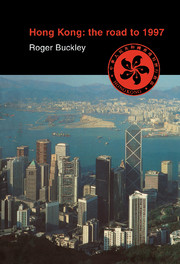Book contents
- Frontmatter
- Contents
- Preface
- Acknowledgements
- Glossary
- Map: Hong Kong, 1997
- Introduction: prewar colony
- 1 Reoccupation: postwar comeback, 1945–7
- 2 Consolidation: the Grantham years, 1947–58
- 3 Growth: the 1960s
- 4 Transformation: the MacLehose years, 1971–82
- 5 Negotiations: Sino-British diplomacy, 1982–92
- 6 Confrontation: the Patten years, 1992–5
- 7 Future: to 1997 and beyond
- 8 Conclusions: endgame
- Appendixes
- 1 Governors of Hong Kong since the Pacific war
- 2 Composition of LegCo, 1964–96
- 3 Public expenditure
- 4 The Joint Declaration
- 5 The Basic Law
- 6 The die is cast
- 7 The first chief executive of the SAR
- Bibliography
- Index
7 - The first chief executive of the SAR
Published online by Cambridge University Press: 20 November 2009
- Frontmatter
- Contents
- Preface
- Acknowledgements
- Glossary
- Map: Hong Kong, 1997
- Introduction: prewar colony
- 1 Reoccupation: postwar comeback, 1945–7
- 2 Consolidation: the Grantham years, 1947–58
- 3 Growth: the 1960s
- 4 Transformation: the MacLehose years, 1971–82
- 5 Negotiations: Sino-British diplomacy, 1982–92
- 6 Confrontation: the Patten years, 1992–5
- 7 Future: to 1997 and beyond
- 8 Conclusions: endgame
- Appendixes
- 1 Governors of Hong Kong since the Pacific war
- 2 Composition of LegCo, 1964–96
- 3 Public expenditure
- 4 The Joint Declaration
- 5 The Basic Law
- 6 The die is cast
- 7 The first chief executive of the SAR
- Bibliography
- Index
Summary
On 11 December 1996 Tung Chee-hwa (C.H. Tung) was elected the first chief executive of the Special Administrative Region of Hong Kong. Following the overwhelming vote of a hand-picked 400-member Chinese selection committee, Tung began preparations for assuming office on 1 July 1997 by visiting Governor Patten and then flying to Beijing to meet his future overlords.
Tung, who comfortably defeated two rival candidates, argued that his election was unprecedented in Hong Kong's history. With this stage-managed endorsement Tung, the most conservative, pro-business and closest to Beijing of the contestants, could now claim to have a mandate of sorts to oversee the transition era.
He started by reassuring the territory that Anson Chan, the present chief secretary, would remain in her post after the transfer of sovereignty. His insistence, however, on maintaining the Chinese-sponsored Provision Legislature has disappointed many in the territory. It follows that Chris Patten's elected LegCo will be dissolved immediately after the SAR is inaugurated and that the 60-member Provisional Legislature (boycotted and subject to challenge from Hong Kong's Democratic Party) will remain in power for a year pending fresh elections. Anxiety is also widespread over clear restrictions on freedom of speech, assembly and demonstrations that will now follow, as ordered by the PRC, once Tung and his tame Provisional Legislature takes over. Official British protests at these limitations on human rights were dismissed as ‘totally unreasonable’ by the Chinese foreign ministry.
- Type
- Chapter
- Information
- Hong Kong: The Road to 1997 , pp. 226Publisher: Cambridge University PressPrint publication year: 1997



